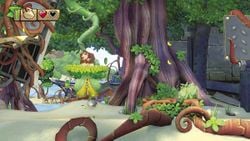Venus Trap Platform: Difference between revisions
Tag: Mobile edit |
m (Reverted edits by 112.254.234.103 (talk) to last revision by PorpleBot) Tag: Rollback |
||
| Line 8: | Line 8: | ||
|Jap=パクリィ<ref>「ドンキーコングトロピカルフリーズ任天堂公式ガイドブック」 (''Donkey Kong Tropical Freeze Nintendo Kōshiki Guidebook''), [[media:DKTF Shogakukan P16.jpg|page 16]].</ref> | |Jap=パクリィ<ref>「ドンキーコングトロピカルフリーズ任天堂公式ガイドブック」 (''Donkey Kong Tropical Freeze Nintendo Kōshiki Guidebook''), [[media:DKTF Shogakukan P16.jpg|page 16]].</ref> | ||
|JapR=Pakuryi | |JapR=Pakuryi | ||
|JapM=Corruption of「パクり」(''pakuri'', | |JapM=Corruption of「パクり」(''pakuri'', onomatopoeia for biting or chomping sound) | ||
}} | }} | ||
Revision as of 10:40, May 22, 2022

Venus Trap Platforms[1] are carnivorous plants from Donkey Kong Country: Tropical Freeze. They hang upside down and are supported by a coiled, flexible stem, which allows them to drop down and attack smaller creatures, then quickly return to their normal position. They will lunge towards the Kongs or any enemy that moves beneath them. Venus Trap Platforms can be avoided as they descend to attack, but cannot be destroyed. The base of their heads is coated with a leaf crown, which serves as a platform. The Kongs can quickly mount the plant while it is close to the ground an be lifted to higher areas as it rises back.
Venus Trap Platforms can only be found in the first level of the game, Mangrove Cove. A later level, Bramble Scramble, presents the similar-looking Chompettes.
Names in other languages
| Language | Name | Meaning | Notes |
|---|
Reference
- ^ von Esmarch, Nick, and Cory van Grier. Donkey Kong Country: Tropical Freeze PRIMA Official Game Guide. Page 25.